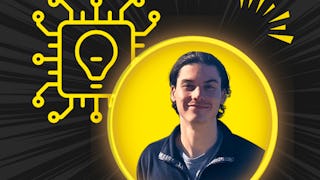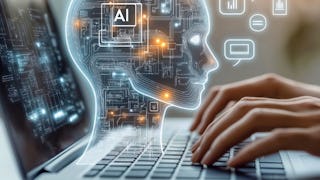Filter by
SubjectRequired
LanguageRequired
The language used throughout the course, in both instruction and assessments.
Learning ProductRequired
LevelRequired
DurationRequired
SkillsRequired
SubtitlesRequired
EducatorRequired
Explore the Biomedical Engineering Course Catalog

Lund University
Skills you'll gain: Environment and Resource Management, Materials Management, Environmental Science, Systems Thinking, Supply Chain Management, Environmental Policy, Product Lifecycle Management, Business Strategies, Industrial Design, Innovation, Stakeholder Engagement, Consumer Behaviour

University of Colorado Boulder
Skills you'll gain: User Story, SQL, New Product Development, Systems Engineering, Real-Time Operating Systems, Field-Programmable Gate Array (FPGA), Failure Analysis, Delegation Skills, Unsupervised Learning, Object Oriented Design, Sampling (Statistics), Supplier Management, Sustainability Reporting, Accountability, Data Ethics, Data Mining, Proposal Writing, Generative AI, Process Capability, Diversity Equity and Inclusion Initiatives
 Status: NewStatus: Free Trial
Status: NewStatus: Free TrialSkills you'll gain: User Story, Requirements Elicitation, Requirements Management, Business Requirements, User Requirements Documents, Requirements Analysis, Verification And Validation, SAP Applications, Functional Specification, User Acceptance Testing (UAT), Stakeholder Engagement, Process Mapping
 Status: NewStatus: Free Trial
Status: NewStatus: Free TrialSkills you'll gain: Data Manipulation, Python Programming, Probability & Statistics, Pandas (Python Package), Data Science, Statistical Analysis, NumPy, Applied Machine Learning, Machine Learning, Machine Learning Algorithms, Descriptive Statistics, Artificial Intelligence and Machine Learning (AI/ML), Data Analysis, Probability
 Status: New
Status: NewSkills you'll gain: Generative AI Agents, Agentic systems, Artificial Intelligence and Machine Learning (AI/ML), Generative AI, Artificial Intelligence, Large Language Modeling, Decision Support Systems, Application Deployment, Prompt Engineering, Applied Machine Learning, Scalability, Performance Testing, Data Integration
 Status: New
Status: NewSkills you'll gain: Software Documentation, Test Automation, Generative AI, Software Testing, Vulnerability Assessments, Test Case, Software Quality Assurance, Application Security, Secure Coding, Full-Stack Web Development, Artificial Intelligence, Prompt Engineering, Technical Documentation, Application Programming Interface (API)
 Status: NewStatus: Free Trial
Status: NewStatus: Free TrialSkills you'll gain: Requirements Management, Solution Design, Business Analysis, Requirements Elicitation, Stakeholder Management, Requirements Analysis, Business Requirements, Systems Analysis, Business Strategy, Business Process, Business Process Management, Business Intelligence, Risk Analysis, Agile Methodology, Performance Measurement
 Status: New
Status: NewSkills you'll gain: GitHub, Version Control, Object Oriented Programming (OOP), Debugging, Development Environment, C# (Programming Language), Microsoft Visual Studio, Microsoft Development Tools, Computer Programming, Programming Principles, Integrated Development Environments, .NET Framework, Data Structures
 Status: NewStatus: Free Trial
Status: NewStatus: Free TrialSkills you'll gain: Data Storytelling, Business Analysis, Systems Development Life Cycle, Test Planning, Business Process Modeling, Unified Modeling Language, Process Optimization, Requirements Management, Systems Analysis, Business Requirements, Stakeholder Management, User Acceptance Testing (UAT), Process Analysis, Data Modeling, Agile Methodology, Stakeholder Engagement, Requirements Analysis, Data Visualization Software, Information Technology, Computer Hardware
 Status: NewStatus: Free Trial
Status: NewStatus: Free TrialSkills you'll gain: Systems Development Life Cycle, Systems Analysis, Requirements Analysis, Business Systems Analysis, Requirements Elicitation, Unified Modeling Language, Agile Methodology, User Requirements Documents, Process Design, Problem Management, Systems Thinking, Business Process, Information Technology, Information Systems
 Status: New
Status: NewCoursera Instructor Network
Skills you'll gain: Account Management, Client Services, AI Personalization, Customer Engagement, Generative AI Agents, Customer Communications Management, Personalized Service, Customer Insights, Prompt Engineering, Communication, ChatGPT, Scalability, HubSpot CRM, Predictive Modeling, Business Process Automation, Business Ethics, Workflow Management, Automation

National Taiwan University
Skills you'll gain: 3D Modeling, SketchUp (3D Modeling Software), Software Installation, Visualization (Computer Graphics), Computer Graphics
Biomedical Engineering learners also search
In summary, here are 10 of our most popular biomedical engineering courses
- Circular Economy - Sustainable Materials Management: Lund University
- Master of Science in Data Science: University of Colorado Boulder
- Requirements Gathering and Documentation: SAP
- Foundations of ML & Python for Data Science: Packt
- H2O.ai Agents : From Theory to Practice: H2O.ai
- Generative AI Course in Software Testing and Documentation: Simplilearn
- CBAP Certification Business Analysis Training: Simplilearn
- Introduction to Programming with C#12 and .NET8: Packt
- IBM Systems Analyst: IBM
- Introduction to Systems Analysis: IBM










